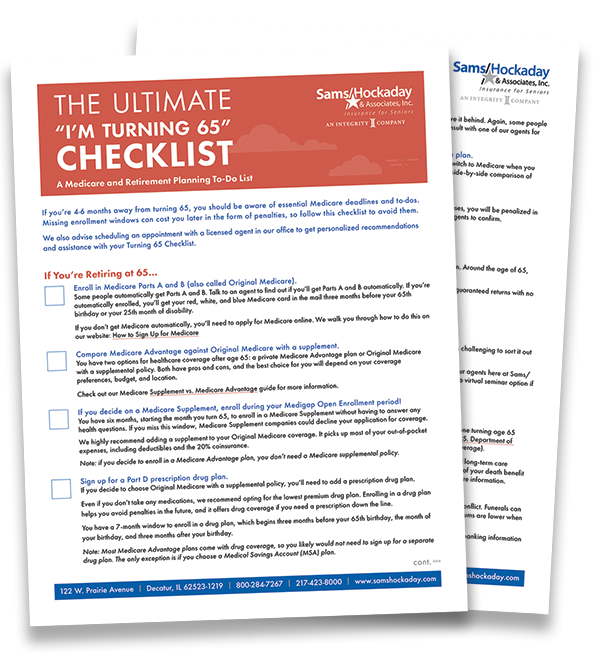
What Is the Late Enrollment Penalty for Medicare Part B?
Late enrollment in Medicare Part B can hike your premiums up by 10% or more.
Here’s everything you need to know about the Part B late enrollment penalty – plus, how to avoid it.
Get Your “I'm Turning 65” Checklist
Are you turning 65 soon? Avoid missing critical Medicare enrollment deadlines with this Turning 65 Checklist.
Get My Checklist
Medicare Part B Late Enrollment Penalty
If you don’t sign up for Medicare when you’re first eligible, your monthly premium could go up 10% for each 12-month period you could’ve had Part B but didn’t.
If you went 14 months without Part B, you’d be penalized 10%. If you went 30 months without Part B, you’d be penalized 20%.
As an example, let’s say you go two years without Medicare Part B. The standard Part B premium in 2022 is $170.10. But your premium would be $204.24, or $34.02 more than everyone else because of your 20% penalty.
The Part B late enrollment penalty is for life, and it’s a hefty penalty. A 10% penalty over the course of two decades would cost you at least $8,000, though it will be considerably more as the Part B premium goes up every year.
That’s why it’s so critical to know your enrollment periods and ensure you’re enrolled in Part B if you’re eligible and don’t have other health coverage.
How to Avoid the Part B Late Enrollment Penalty
To avoid the Part B late enrollment penalty, you need to know your enrollment deadlines.
Most people need to enroll in Medicare Part B during their 7-month initial enrollment period, which begins 3 months before their 65th birthday, includes the month of, and lasts for 3 additional months after the 65th birthday.
And for some, they can enroll in Medicare Part B at the end of a qualifying special enrollment period.
A common example we see is if you work past age 65 and have credible health coverage through your employer. Once you leave your employer’s group plan, you’ll have a special enrollment period where you can sign up for Part B and avoid the late enrollment penalty.
What if I miss my initial enrollment period?
If you miss your initial enrollment period, or that 7-month window wrapping around your 65th birthday, you’ll have to wait until the Medicare General Enrollment Period (GEP). The GEP lasts from January 1-March 31 each year.
You can enroll during this window, but coverage doesn’t start until July 1st. This means you could go many months with no health insurance.
We encourage you to reach out to our office before you turn 65 to ensure you don’t miss any enrollment windows. Our licensed insurance agents can help you navigate your personal enrollment windows to make sure you don’t accrue any penalties or have gaps in coverage.
Can I appeal a late enrollment penalty?
If you feel you shouldn’t have to pay the Part B late enrollment penalty, you can appeal it with Medicare. However, the appeals process is a lengthy one, and you still have to pay the penalty while your case is under review.
Conclusion
The best way to avoid the Part B late enrollment penalty is to reach out to a licensed insurance agent several months before you turn 65.
The agents in our office are seasoned Medicare professionals and know all of the ins and outs. They can walk you through your plan options and ensure you don’t face lifetime penalties or lags in coverage.
To schedule an appointment, call our office at 217-423-8000 or visit our online scheduling system.
Free Medicare 101 Email Course
From a mailbox bursting with Medicare flyers to penalties, you don’t want to miss a thing. This 5-day course features simple explanations & easy action items, so you can take control of your own Medicare plan.
Instant Sign Up!


